5 Ways Vegetarianism Could Save the World; 5 Buddhist Teachings and Teachers Recommending a Vegetarian Lifestyle; 5 Reasons it’s the Ethical Thing to Do
Not all Buddhists are vegetarians. Did the Buddha actually suggest a vegan lifestyle? And, putting aside Buddhists, why is the meat industry growing when the science says it’s hurting our planet? These are the questions that frame our special feature focusing on Vegetarianism: five ways it could save the world, five Buddhist teachings that recommended veganism, and five reasons it’s just the ethical thing to do. And, since not everyone reading this feature is a Buddhist, let’s start with the science.
Over 56 billion farmed animals are killed each year by humans — 10 billion land animals in the U.S. alone. 3,000 die each second. This does not include countless fish. Billions of animals suffer and die painfully — animals who, according to scientists, are sentient and feel emotions. [4]. Put another way, each person who eats meat, is directly responsible for the lives of an average of 95 slaughtered animals each year. [5]
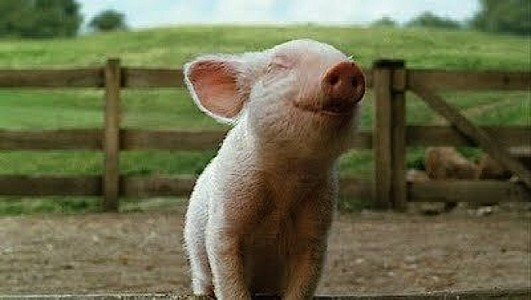
The Scientific Buddhist, 5 Ways Vegetarianism Could Save the Planet
The data and science do suggest vegetarianism could indeed save the world. There’s a big “ism” in this statement. The only way vegetarianism could help save the world is if at least 25 percent of us stopped eating our earthly companions — non-human sentient beings. How is it possible that simply reducing demand for meat could save the planet? The most compelling reasons include:
- emissions — the meat industry is one of our largest polluters, more than all cars and planes put together [1]
- scarcity of land — 30% of the available ice-free surface area of the planet is now used by livestock, estimated to soon increase to 45%
- inability to feed our population: perhaps more urgent than the environment is our inability to currently feed the world’s population, in part due to the unbalanced allocation of land: meat production uses 23 times as much land as crop production.
- overuse of important resources such as water — and pollution of water.
Reduction in demand for meat by any sizeable percentage, would ease many of the issues and pressures identified by experts.
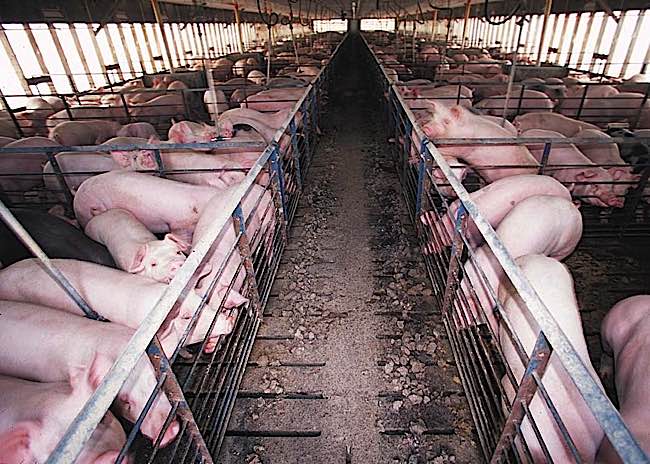
If we’re serious about global warming and the environment, even modest reductions in dependence on meat will have a higher impact on the environment than things such as emissions controls on automobiles.
That restaurant steak on the plate could represent 9,000 liters of water, 40 kilograms of poop (waste), 4 kilograms of feed and more emissions pollution than a car might create on an hour-long drive to the restaurant.
Animals are Sentient and Feel Emotions say Prominent Scientists
Science also supports the view that animals are sentient, which makes the ethical arguments all the more compelling. “A prominent international group of cognitive neuroscientists and other experts made a strong declaration, endorsed by Stephen Hawking, affirming that all “nonhuman animals… including octopuses” are sentient and feel emotions such as fear and happiness. We wrote about this in a popular Buddha Weekly feature: “Prominent scientists declare “All non human animals … are conscious beings.” (View here>>)
We challenged readers: “The advance in non-human rights begs the question, from a Mahayana Buddhist perspective, when we promise to liberate all sentient beings — or not to kill — just who do we include? If our definition includes all beings down to insects and octopuses, how do we reconcile our dependence on “lower” beings for survival?”

The 17th Gyalwang Karmapa gives a very direct answer:
“We say I am going to do everything I can to free sentient beings from suffering. We say I am going to do this. We make the commitment. We take the vow. Once we have taken this vow, if then, without thinking anything about it, we just go ahead and eat meat, then that is not okay. It is something that we need to think about very carefully.”[3] The Dalai Lama also strongly recommends vegetarianism.
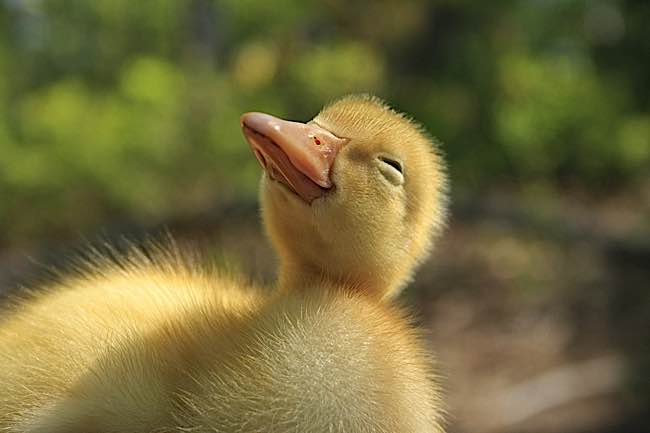
We asked Buddhist teacher Theodore Tsaousidis, of the Grey Bruce Mindfulness Centre, to put this in perspective. He didn’t sugar coat his view:
“If you claim to be a compassionate person or Buddhist in the 21st century and still eat meat, there are possible elements of pathology, hypocrisy and ignorance that beg reflection.”
But, before examining the ethics and Buddhist perspective, let’s start with five ways meat is damaging the environment and our world.
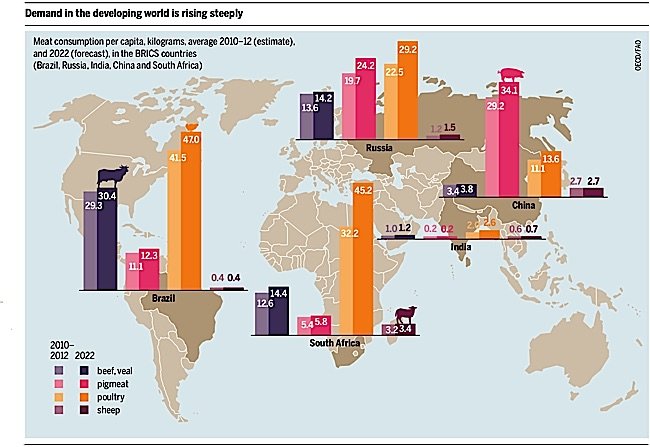
Just the Facts: Why the Meat Industry is Damaging our Environment
The meat industry is one of the largest emissions contributors, producing more emissions than all the automobiles and planes put together. This issue will only be exacerbated by the expected growth of our population 4 billion. As a practical consideration, putting aside environment, ethics and all, there is not enough land to produce that much meat. It’s worth remembering that developing nations are quickly becoming advanced nations, increasing demand for meat.
There are some simple, largely indisputable, well-cited facts, that lead to the concept: “5 Ways Vegetarianism Can Save the Planet” story, only some of which we quote here (we recommend a read of the article of the same name in The Guardian>>)
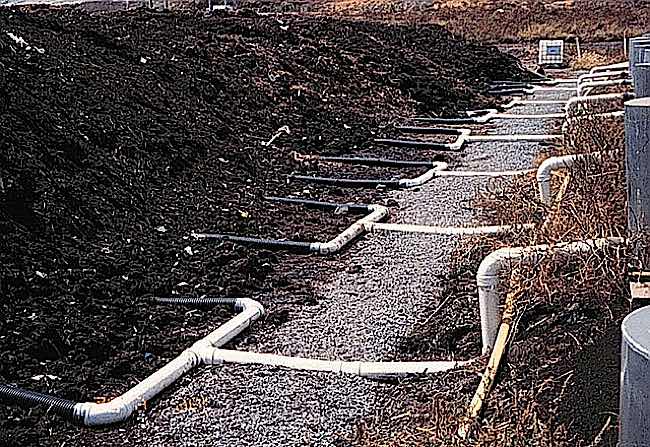
Fact One — 18% of Global Climate Emissions are a result of meat production, more if you include supporting factors [1]
Factory farming is responsible for 37% of all methane emissions “which has 20 times the global warming potential of CO2.”[6]
“We humans eat about 230m tonnes of animals a year, twice as much as we did 30 years ago,” according to The Guardian newspaper. “We mostly breed four species – chickens, cows, sheep and pigs – all of which need vast amounts of food and water, emit methane and other greenhouse gases and produce mountains of physical waste… UN calculated that the climate change emissions of animals bred for their meat was… more than cars, planes and all other forms of transport put together.”
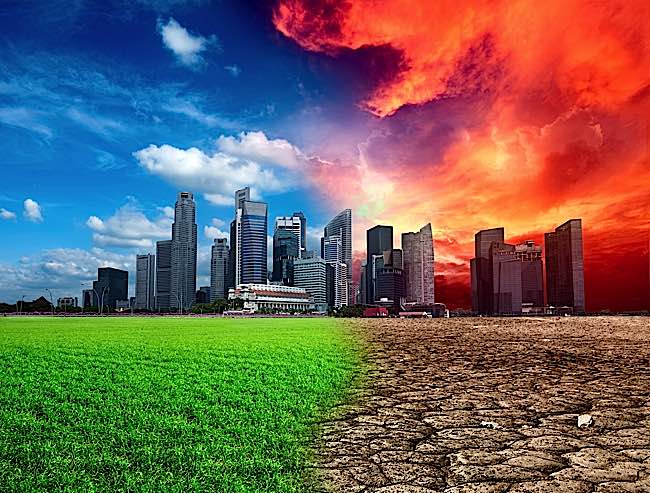
World Bank Scientists pegged the number at much higher, because they include extra considerations like clear-cutting oxygen producing forests to favor animal agriculture, fertilizers and many other factors, such as transport, bringing the total up to 51%.
In other words, if only 25% of the world’s population converted to vegetarianism, the impact on the environment would be staggering. That’s a fact, not even arguable (although certainly some will try. Which brings us to fact Two — the population is increasing.

Fact Two — It takes 23X as much land to grow our vegetables as to raise meat livestock — not enough land to feed the expected increase in world populations.
Currently, according to facts cited in the Guardian feature: “Nearly 30% of the available ice-free surface area of the planet is now used by livestock, or for growing food for those animals. One billion people go hungry every day, but livestock now consumes the majority of the world’s crops.”
In other words, when the population grows by only 3 billion, we’ll need to consume another 15% — assuming demand per person doesn’t increase as nations grow richer—and we’ll have another 500 million starving humans. For livestock, 45% of land in the world — and unlikely possibility, even if we clear cut the few remaining forests (which leads us to the third fact — deforestation). Not all land is suitable for livestock. Of course, speaking facetiously, if the polar icecaps keep melting we may have more land for meat.
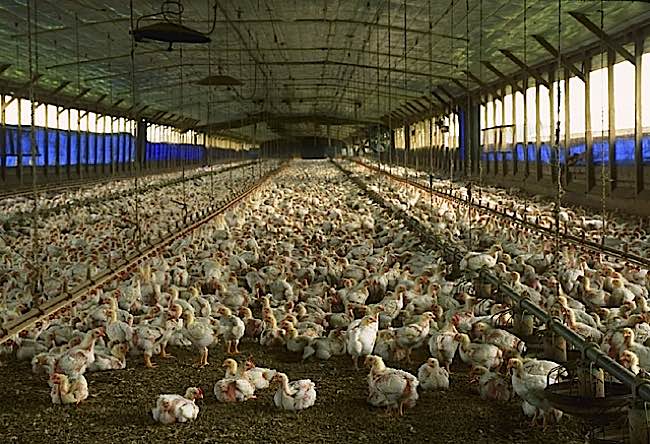
Put another way, in the US. alone, 13m hectares of land are used to grow vegetables, while it takes nearly 23 times that much, 302m hectares for livestock. “The problem is that farm animals are inefficient converters of food to flesh,” writes the Guardian. For example, pigs need 8.4kg of feed to produce one kilogram of meat.
Fact Three — Millions of hectares of trees cut to produce burgers
Agriculture in general is causing deforestation, mostly for meat and a few crops such as palm oil and soya. Write the Guardian: “Millions of hectares of trees have been felled to provide burgers for the US and more recently animal feed for farms for Europe, China and Japan.” 6m hectares of forest land a year are lost (roughly twice the size of Belgium) with most converted to farmland. Putting aside the destruction of animal habitat there’s an enormous climate cost. The second largest crop to go on that clear-cut land is soybeans, mostly grown to feed the cattle.
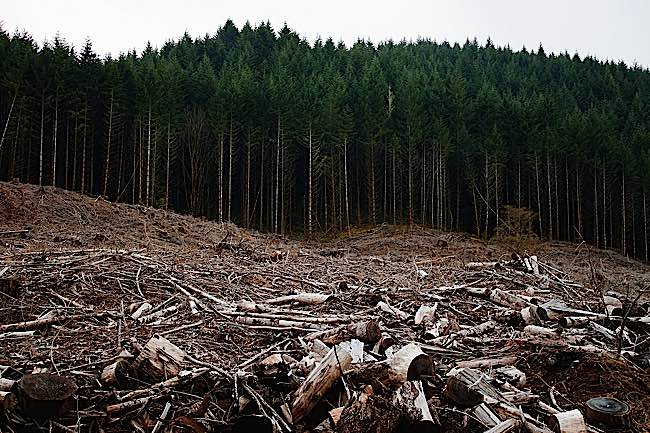
Fact Four — A single cow farm can generate as much waste as a small city
The Guardian: ” Industrial-scale agriculture now dominates the western livestock and poultry industries, and a single farm can now generate as much waste as a city. A cow excretes around 40kg of manure for every kilogram of edible beef it puts on and when you have many thousands crowded into a small area the effect can be dramatic. Their manure and urine is funneled into massive waste lagoons sometimes holding as many as 40m gallons.”
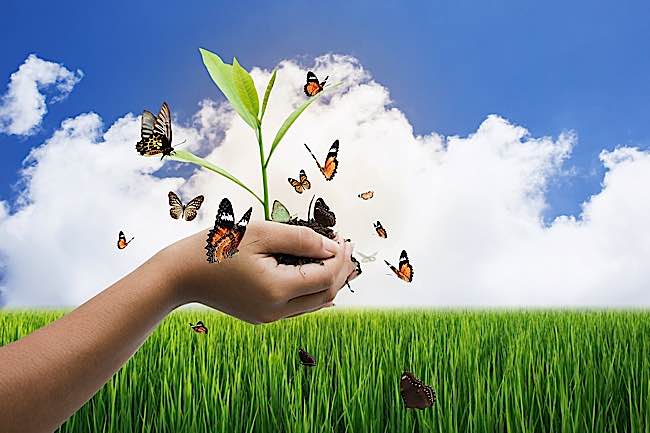
The article goes on to present shocking pollution statistics, such as “most summers between 13,000 and 20,000 sq km of the sea at the mouth of the Mississippi becomes a “dead zone”, caused when vast quantities of excess nutrients from animal waste, factory farms, sewage, nitrogen compounds and fertilizer are swept down the might river.” There are nearly 400 dead zones that have been identified, largely due to animal farming.
Fact Five: Current meat animals drink too much: producing a pound of beef requires 9,0000 litres of water
It may not be a top of mind issue in North America, where water is somewhat plentiful, if polluted. But in most other parts of the world, water shortage and clean water is a serious, even life-threatening issue.
It requires approximately 9,000 litres of water (20,000 pounds) to produce one pound of beef, 1,000 litres to produce one litre of milk. A broiler chicken “only” consumes 1,500 litres. Pigs are the worst, with the largest pig farms consuming as much water as a normal-sized human city.
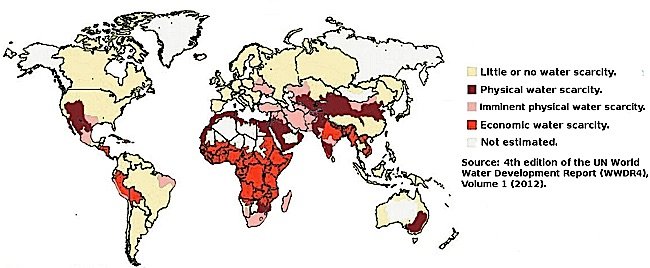
There is no doubt that farming consumes the majority of our water, 70% according to expert estimations, but this number could be dramatically reduced if we transitioned more food output to crops versus meat.
For instance, potatoes take between 60 and 229 pounds of water per pound of produce — as compared to 20,000 pounds of water for a pound of beef. [1]
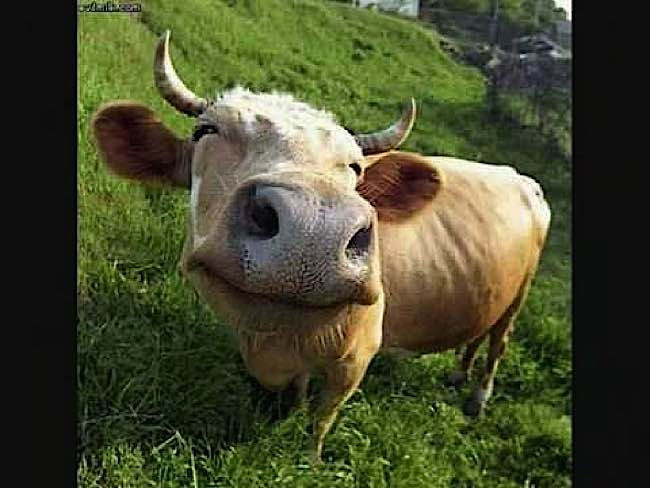
Bottom Line — Meat a higher negative impact on the environment as compared to other major industries.
If we put aside ethical and Buddhist arguments, the meat industry is harmful to our collective help. Even a modest decrease in demand for meat can result in positive environmental returns. Significant decreases in demand could, literally, save our planet.
5 Buddhist Teachings and Teachers Recommending Vegetarian Lifestyle
Science not only proves horrendous impact of the meat industry on climate change and our environment, it asserts rather forcefully that even fairly simple non-human animals and birds — including fish — are sentient and have emotions. Both positions might be debatable, but these facts are credibly established. Which returns us to ethics and Buddhist teachings, since helping sentient beings is one of the most important compassion foundations of Mahayana Buddhism.

Earlier, we stated the strong position of Buddhist teacher Theodore Tsaousidis: “If you claim to be a compassionate person or Buddhist in the 21st century and still eat meat, there are possible elements of pathology, hypocrisy and ignorance that beg reflection.”
Is this harsh? Not if you consider the First Precept of the Buddha, “Abstain from Taking Life.” And not, as Mahayana Buddhists, when we vow to “benefit all sentient beings.” Practicing Mahayana Buddhists reinforce that vow and belief each day when we take refuge.
Theodore elaborated on his very strong position:
“If one keeps looking to the Buddha for direction as to whether it is permissible to kill and eat animals, then one doesn’t understand the aim of his teachings. If you, on a basic level, understand the fundamental technology and methodology of Buddhist’s teachings, then whether the question is simple or complex, it can be answered strictly by applying the method the Buddha expounded —which is to ask the question and experience the answer for oneself.
“To do this, one must attend to one’s raw feeling. Without getting entangled in the interpretation of various sources, we can just feel and attend to one question: “Is my action inclusively wholesome, good, compassionate and freeing?”
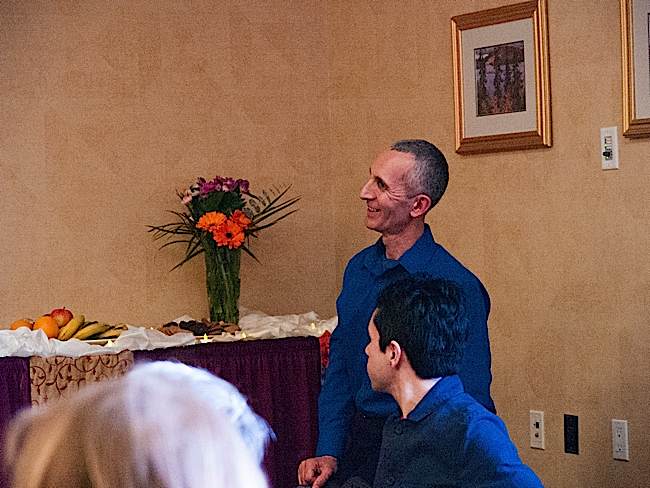
Science asserts that sentient beings include fish, birds and animals. Buddhism might be the middle way, but there is really not much middle ground for a Mahayana Buddhist with regards to eating meat. In Theravadan Buddhism, perhaps, there’s a little leeway, but the Mahayana Buddhist is above all compassionate and working for the benefit of sentient beings.
“If I didn’t ask the butcher to kill the animal, meat is okay, right?”
Generally, early Buddhist monks were instructed by Buddha to eat whatever is given to them. This could include meat, provided they were certain that the animal was not butchered for their benefit. Which, of course, is a wide loop hole, if you consider this to mean “it’s okay as long as I didn’t instruct them to butcher the meat.” However, most reasonable people understand that meat is only butchered due to our demand, so we are all involved in the decision.
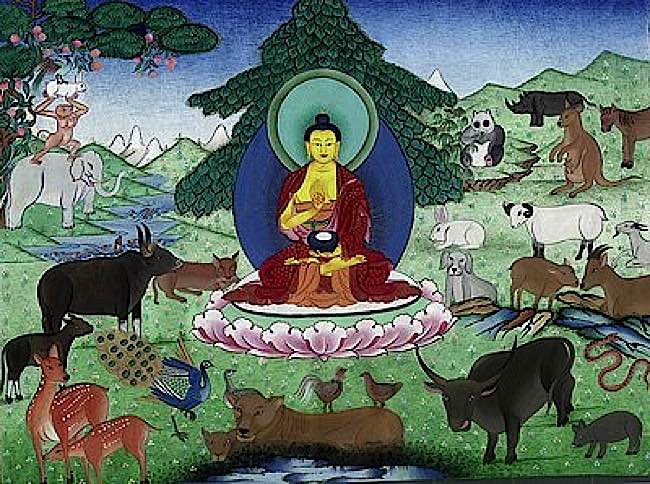
Specifically, Buddha said, in early Theravadan sutras: “Monks, I allow you fish and meat that are quite pure in three respects: if they are not seen, heard or suspected to have been killed on purpose for a monk. But, you should not knowingly make use of meat killed on purpose for you.” In this case, Buddha is teaching that monks should not reject alms, and also it’s important not to waste meat that is already butchered. Generally, this is not interpreted to mean approval of the practice of eating meat itself.
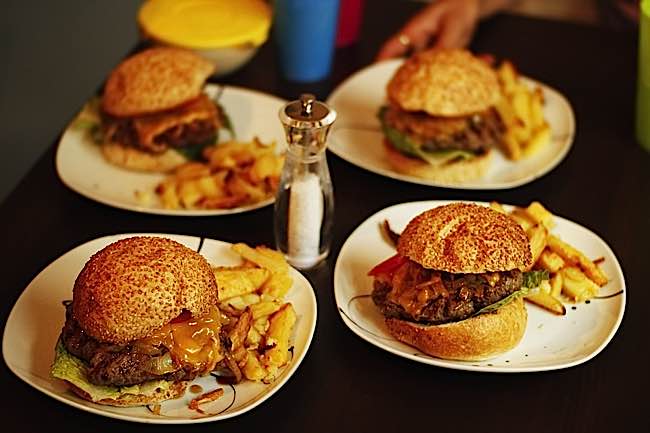
Technically correct? No intention is a thin argument.
It came down to intention. If monks were given meat, they could eat it because they had no intention to do harm (it was given to them, not requested by them) — therefore there was no negative karma. That’s not saying there was no harm done, only that there is no specific ethical problem if there was no intention to harm. It’s a thin argument, perhaps, considering there is knowledge that harm was done, but it’s technically correct in terms of karma.
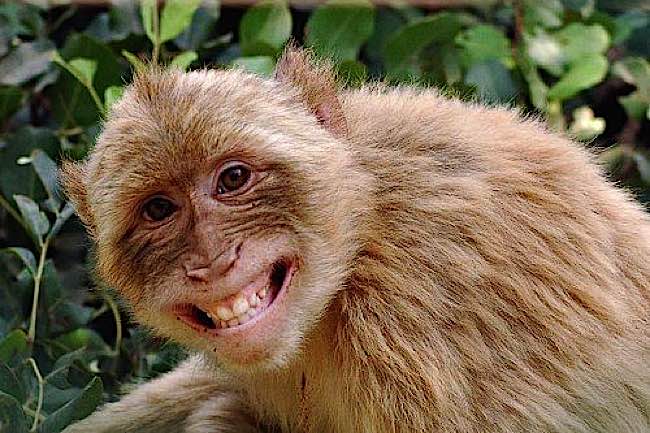
However, since most of us are lay practitioners, we more or less order or buy meat knowing it must be killed for our benefit. Therefore, our middle ground becomes one of — “I’m not ready to be a monk today, but sometime in the future…” If we really want to look the other way, we can also hide behind “no intention to cause harm” but it’s not an easy argument to make when we knowingly buy the meat.
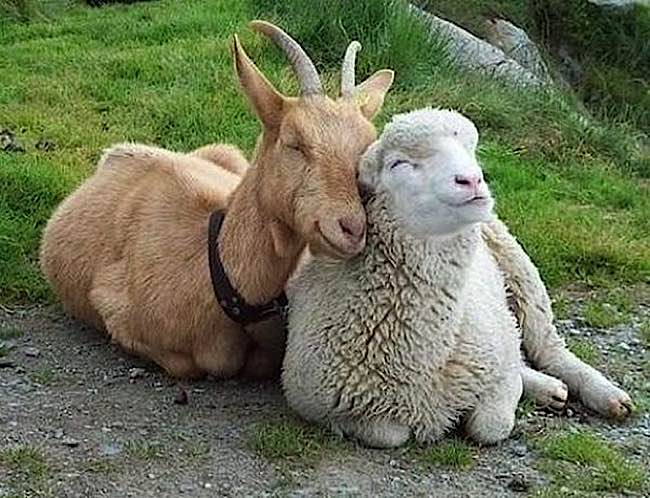
Mahayana sutras, on the other hand, for the most part reject meat and emphasize compassion to all sentient beings — which we now know include non-human animals, birds and fish.
The Dalai Lama: “The best thing is to give up meat.”
In answer to the direct question, “Is it permissible for Buddhists to eat meat?” the Dalai Lama replied in November 2009:
“The best thing is to give up meat entirely. Sometimes one’s lifestyle and circumstances provide no alternative but to eat meat, and in these cases one should eat as little meat as possible. Tibetan monasteries and nunneries in south India became entirely vegetarian 15 years ago. Festivals and ceremonies in all Tibetan monasteries and nunneries should be completely vegetarian.” [3]
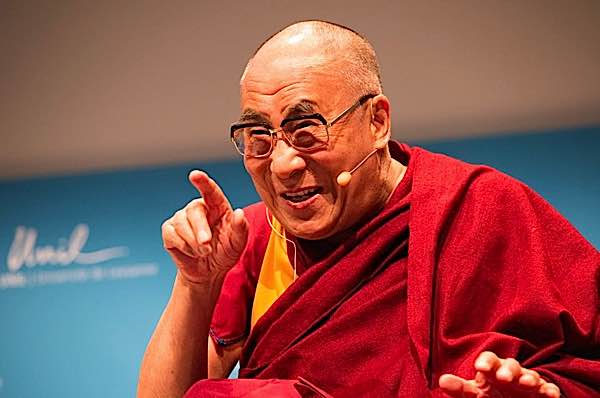
His Holiness 17th Gyalwang Karmapa: Doesn’t eat meat because “of the intense suffering that the animals”
The Gyalwang Karmapa, who is a vegetarian, gave two reasons why he suggests not eating meat (on the official website of the Karmapa): The first reason is the intense suffering that the animals who are killed go through. Every single day millions of animals are killed to feed us, and many are subjected to terrible conditions to provide us with food.”
The second reason is even more directly hard-hitting from a Mahayana Buddhist point of view:
“We say I am going to do everything I can to free sentient beings from suffering. We say I am going to do this. We make the commitment. We take the vow. Once we have taken this vow, if then, without thinking anything about it, we just go ahead and eat meat, then that is not okay. It is something that we need to think about very carefully.”
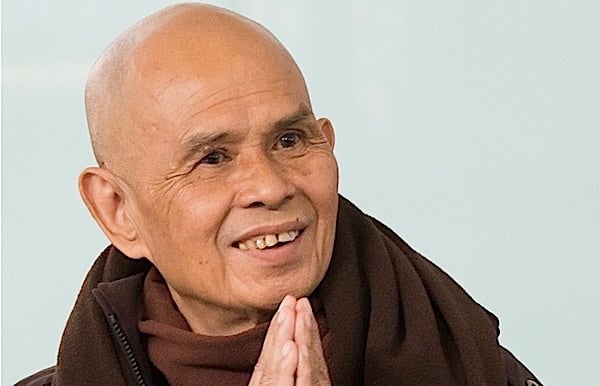
What five other notable Buddhist teachers say about eating meat
 Here are a few snippets (there are thousands to choose from) from the great teachers:
Here are a few snippets (there are thousands to choose from) from the great teachers:
- Bikkhu Bodhi: The first precept, to abstain from killing, includes the “taking of life of any being with breath.”
- Zasep Tulku Rinpoche: “We must not hurt other people and animals.”
- Thich Nhat Hanh: “No killing can be justified…. We must also learn way to prevent others from killing.”
- Kyabje Chatral Sangye Dorje Rinpoche: “Meat, the sinful food.”
- Lama Zopa Rinpoche: ” As there are more and more people becoming vegetarian, that means less and less animals will be killed. So it is very important. In the world people eat meat mainly because of habit; so many people have not thought that the animals experience unbelievable suffering.” [4]
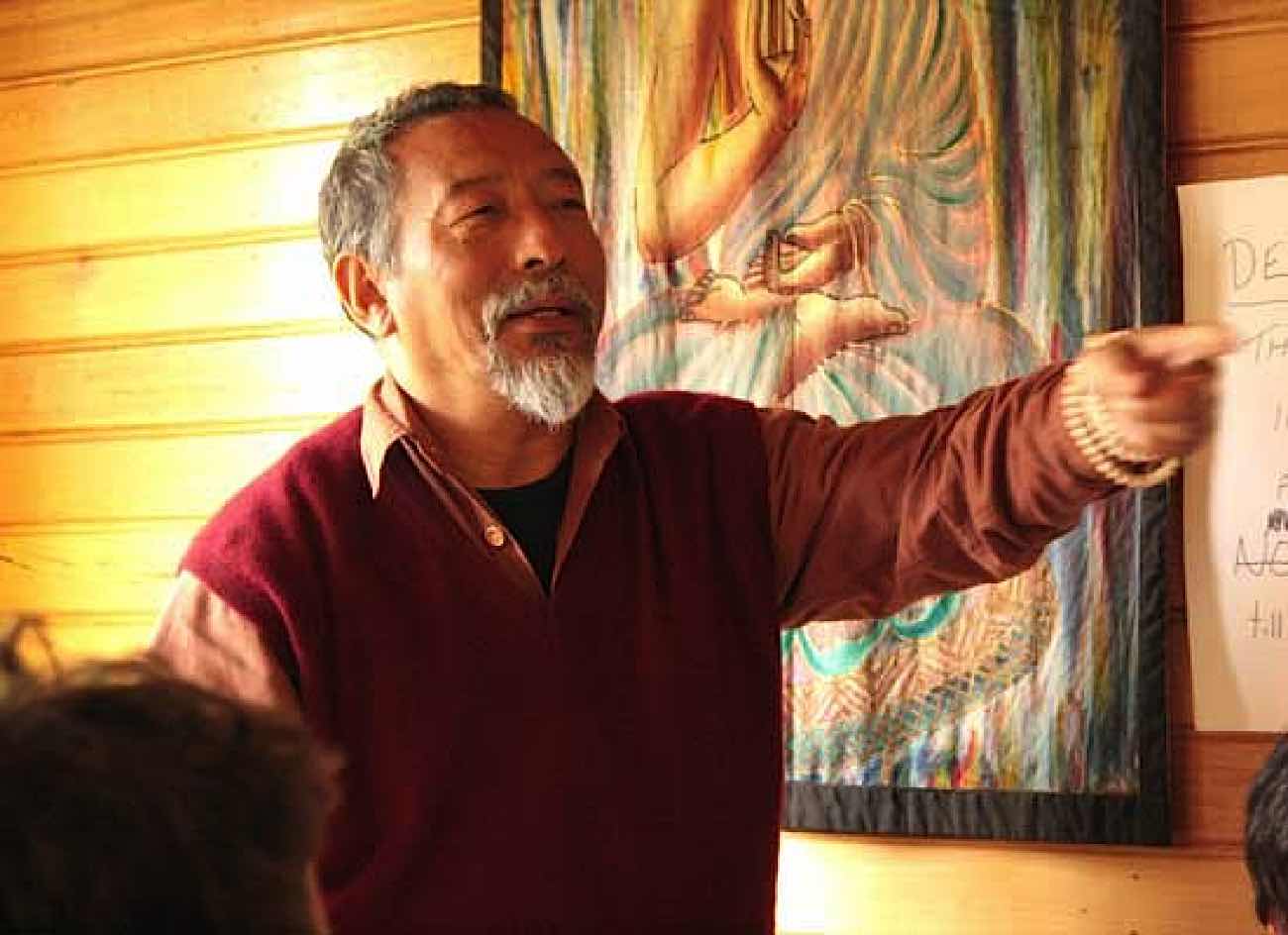
5 reasons becoming a vegetarian is the ethical thing to do
Some might say we should have started here — with the ethics of meat. In general, most non-sadistic people understand animals suffer. Culturally, we are brought up to accept the practice as “survival” even after it has been demonstrated that vegetarianism is healthier and less expensive.
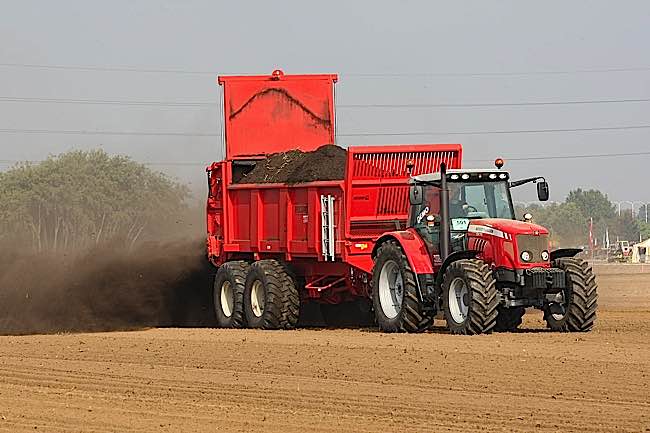
The root of “immorality” of meat eating lies in two premises, backed by science:
- that animals are sentient, suffer and feel emotions
- that the meat industry is unhealthy for our planet.

If those are accepted, practicing Mahayana Buddhists should, according to many Buddhist teachers, include meat animals in vow “to free all sentient beings from suffering.” The greater threat — that of the world slowly eaten away by an environmentally dangerous meat industry —also can’t be ignored as explicit in that vow. Suffering is suffering. Sentience is sentience. And each person who becomes a vegetarian saves an average of 95 animals each year. [5]
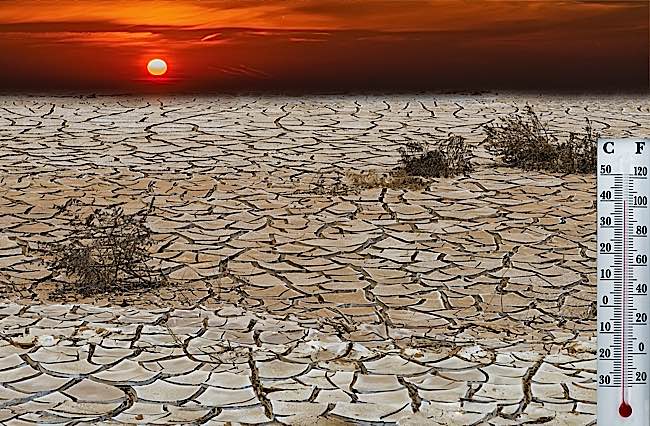
The 5 reasons to abstain or cut back on meat eating are simple:
- Danger to he environment: the meat industry is one of the world’s greatest threats to the environment in terms of pollution, land and resource consumption, and global warming.
- Suffering: Eating animals increases demand for slaughter (approximately 95 animals per year per person), which creates the suffering of billions of sentient beings, all of whom feel emotions.
- Scarcity of food: Since meat animals require approximately 23 times more land than equivalent plant crops, dedicating so much land, water and resources to meat animals, makes it difficult to raise enough food for our current world population
- Buddhist teachings: Abstain from taking life, defined as any breathing animal, and having compassion for any sentient being.
- Economy: As land and resources dwindle, and population grows, meat will become unaffordable, creating inequities around the world.
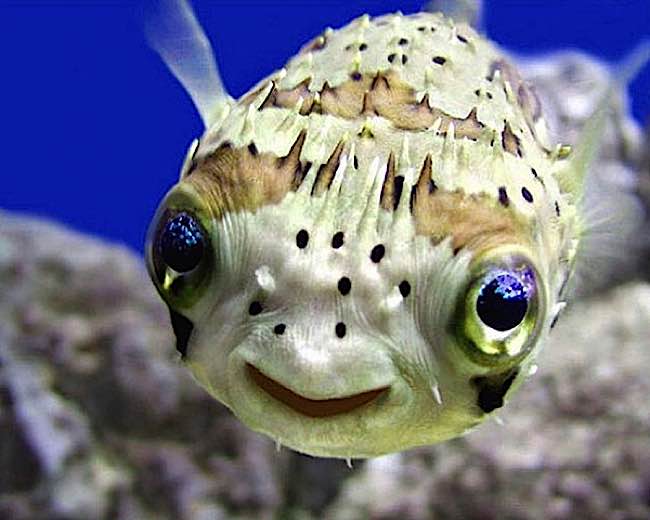
NOTES
[1] The Guardian: “Five Reasons Vegetarians Can Save the World.”
[2] Interview with Theodore Tsaousidis, Buddha Weekly
[3] “Dear Dalai Lama: Is it Permissible for Buddhists to eat meat?” Elephant Journal
[4] Sources of these quotes found in the Buddha Weekly feature, ” Prominent Scientists Declare “All Non Human Animals… Are Conscious Beings.” The Dalai Lama Protests Chicken Slaughter. An Orangutan Won Non-Human Rights Over Zoo Keeper. What Do the Teachers Say About Non-Human Compassion?”
[5] Animal Equality.
5 thoughts on “5 Ways Vegetarianism Could Save the World; 5 Buddhist Teachings and Teachers Recommending a Vegetarian Lifestyle; 5 Reasons it’s the Ethical Thing to Do”
Leave a Comment
More articles by this author
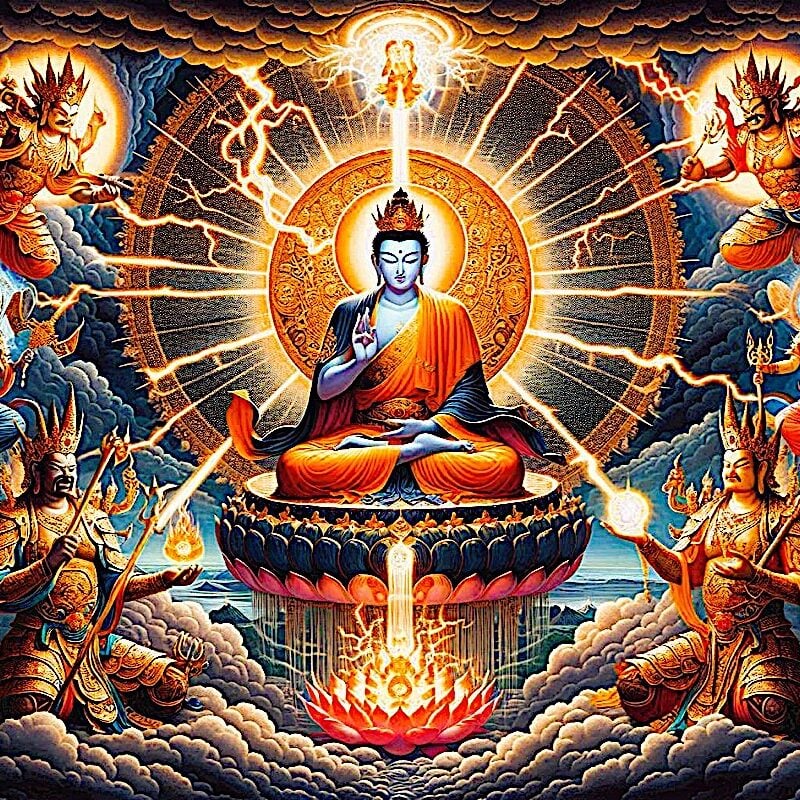
Protection from all Harm, Natural Disaster, Weather, Spirits, Evil, Ghosts, Demons, Obstacles: Golden Light Sutra: Chapter 14
Search
Latest Features
Please support the "Spread the Dharma" mission as one of our heroic Dharma Supporting Members, or with a one-time donation.
Please Help Support the “Spread the Dharma” Mission!

Be a part of the noble mission as a supporting member or a patron, or a volunteer contributor of content.
The power of Dharma to help sentient beings, in part, lies in ensuring access to Buddha’s precious Dharma — the mission of Buddha Weekly. We can’t do it without you!
A non-profit association since 2007, Buddha Weekly published many feature articles, videos, and, podcasts. Please consider supporting the mission to preserve and “Spread the Dharma." Your support as either a patron or a supporting member helps defray the high costs of producing quality Dharma content. Thank you! Learn more here, or become one of our super karma heroes on Patreon.
Lee Kane
Author | Buddha Weekly
Lee Kane is the editor of Buddha Weekly, since 2007. His main focuses as a writer are mindfulness techniques, meditation, Dharma and Sutra commentaries, Buddhist practices, international perspectives and traditions, Vajrayana, Mahayana, Zen. He also covers various events.
Lee also contributes as a writer to various other online magazines and blogs.








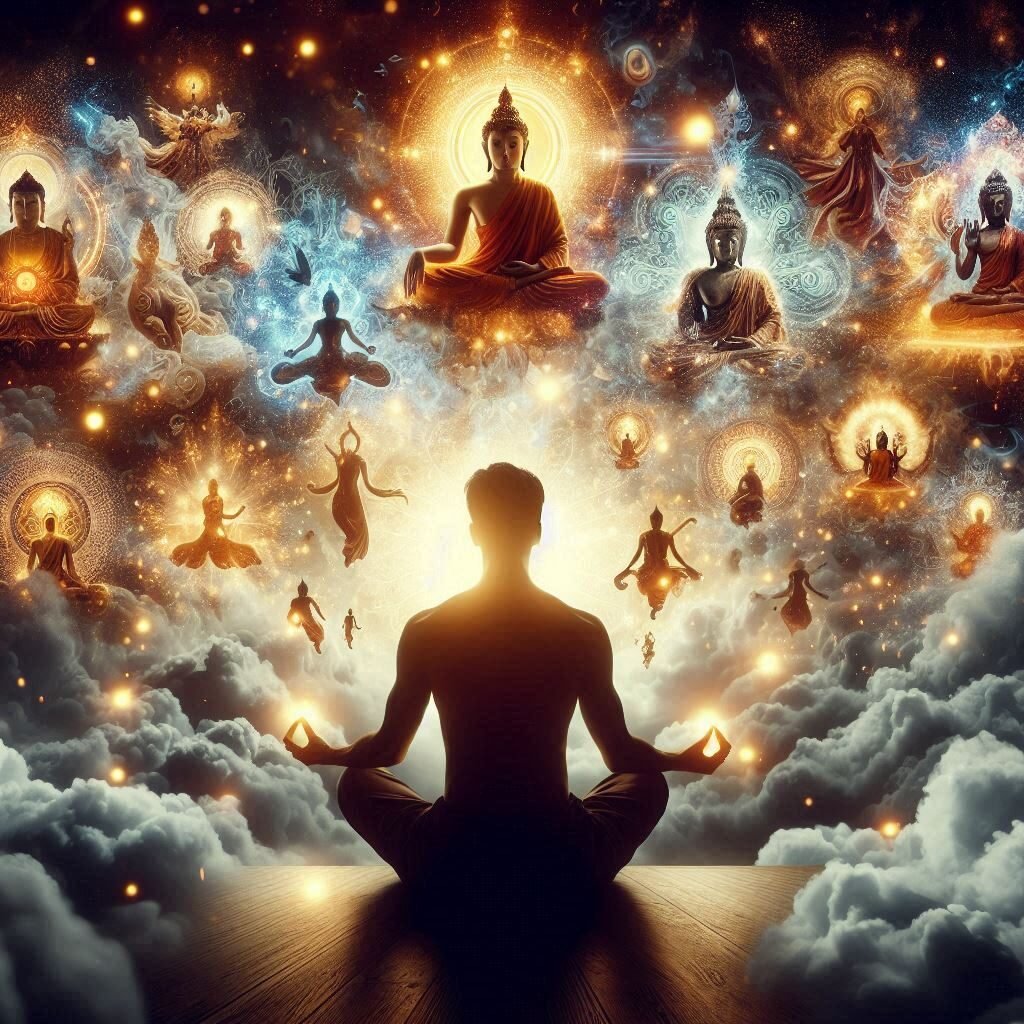

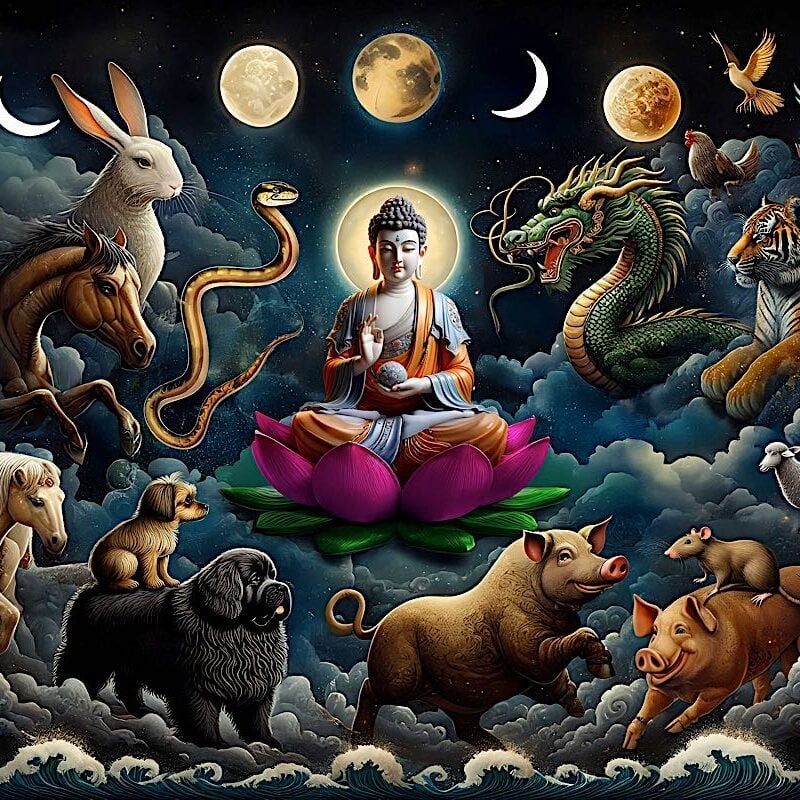
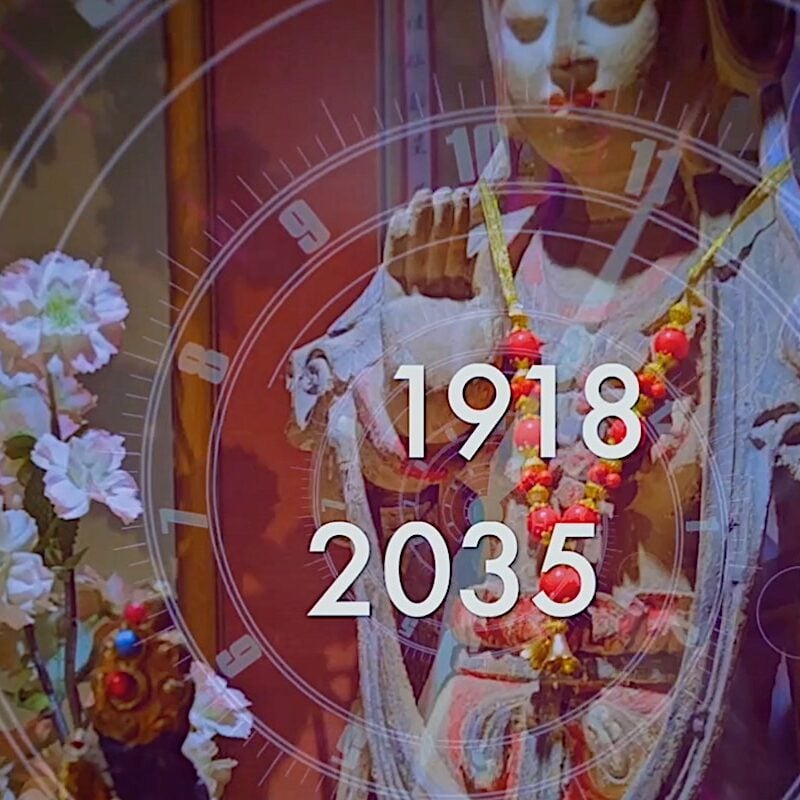

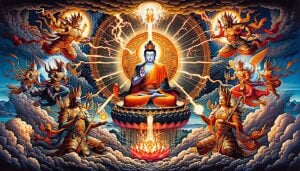



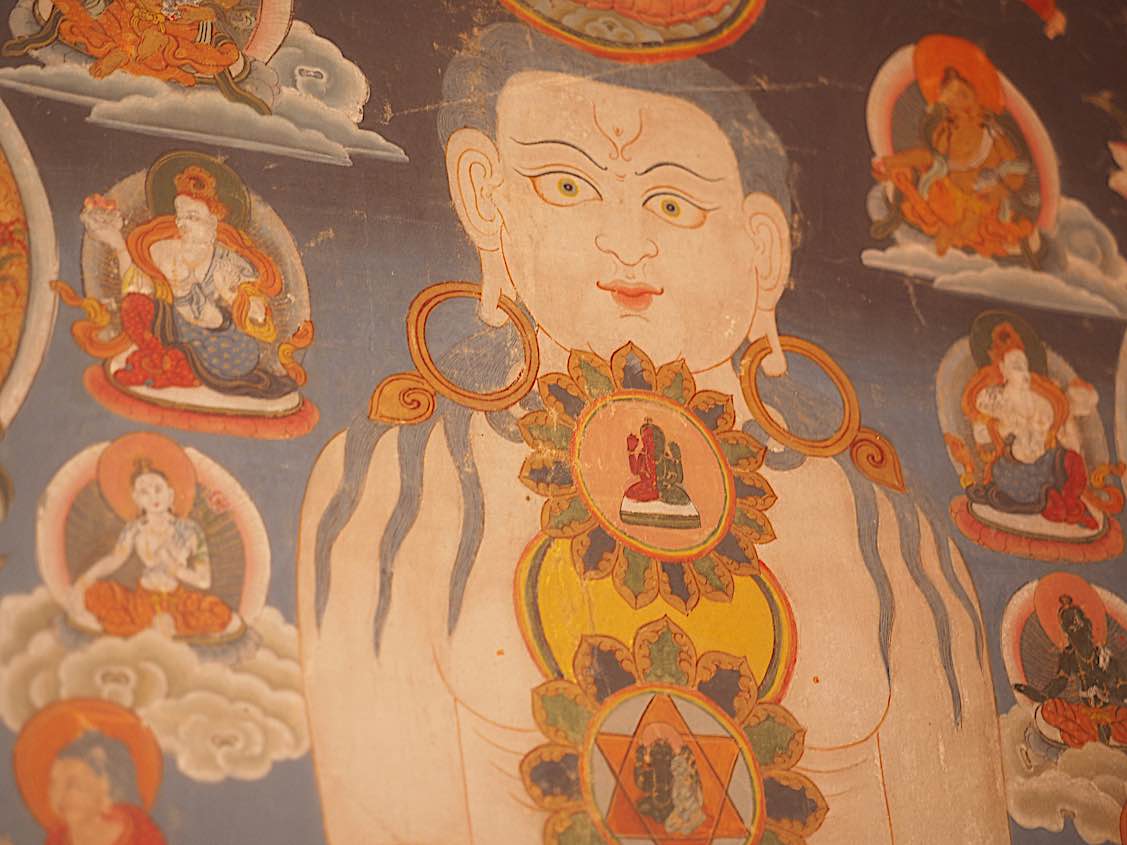
The environmental impact of eating meat vs vegetarianism isn’t as clear cut as you state here. There is recent research which actually contradicts that theory. I believe this is an issue we should all consider.
https://www.cmu.edu/news/stories/archives/2015/december/diet-and-environment.html
Hi Adam
Thank you for making a counter argument. I went to the link, and have to say it was not very convincing and really too specific to be broadly applied. It’s fairly counter intuitive when you consider acreage and resources used in meat farming vs crops. For instance,taking lettuce and a couple other vegetables as representative is not appropriate in the context of the broader argument, even if we accepted the data — which isn’t presented in the article.
I saw no evidence presented and there were no numbers, or citations (other than a single abstract which didn’t seem to address their point directly). Their methodology seemed too narrowly focused to be applied to the meat vs. vegan argument as we presented it. The example scenarios were not specifically vegan vs meat, so wild extrapolation would be required to conclude the contrary to the well-accepted data on the higher environmental impact of factory meat industry
The study abstract linked to the story doesn’t specifically refer to lettuce vs bacon, but rather compares USDA diets, and I quote here from the abstract linked to the story you referenced: “The three dietary scenarios we examine include (1) reducing Caloric intake levels to achieve “normal” weight without shifting food mix, (2) switching current food mix to USDA recommended food patterns, without reducing Caloric intake, and (3) reducing Caloric intake levels and shifting current food mix to USDA recommended food patterns, which support healthy weight. This study finds that shifting from the current US diet to dietary Scenario 1 decreases energy use, blue water footprint, and GHG emissions by around 9 %, while shifting to dietary Scenario 2 increases energy use by 43 %, blue water footprint by 16 %, and GHG emissions by 11 %. Shifting to dietary Scenario 3, which accounts for both reduced Caloric intake and a shift to the USDA recommended food mix, increases energy use by 38 %, blue water footprint by 10 %, and GHG emissions by 6 %. These perhaps counterintuitive results are primarily due to USDA recommendations for greater Caloric intake of fruits, vegetables, dairy, and fish/seafood, which have relatively high resource use and emissions per Calorie.”
Perhaps there is compelling data in the report, but none of it seems as overwhelming convincing as the well-reported numbers specific to factory meat farming.
Finally, nothing in that article talks to the unnecessary suffering of sentient beings in the billions. In kindness, Lee
Oops it’s me again Lee, the lazy me wouldn’t go deep into facts and figures over percentages of pollution breeding animals and the benefits of sticking to Vege diet. I only know everything has to have a balance to keep the world going healthy. If 90% earthlings were to be Vegetarian, then Scientists had better come up with safe natural manure for crops. Unless human manure is being used instead to replace animal farms boops. Are the government in all over this world willing to allocate substantial amount of budget to do this transformation. Eating meat could be a habit in most where their cooking talent is moderate but for people in Asia especially China, Hong Kong even Malaysia, eating meat seafood is a craving as the cooks and average family are superbly wonderful natural good cooks. So i only wish and hope that half of the other parts of the world are Vegetarian while the sencond half which mostly beyond their ‘control’ stick to their desire of eating meat. Sounds selfish….but its the way to keeps things balanced. Please enlighten me coz I truly appreciate wise guidance. Thank you.
J Relig Health. 2017 Oct 20. doi: 10.1007/s10943-017-0511-0. [Epub ahead of print]
Equivalent Reduction in Greenhouse Gas Emissions by Mahayana Buddhists Practicing Vegetarian Diets.
Tseng AA1.
Author information
Abstract
The equivalent reduction in greenhouse gas emissions (GHGEs) by Mahayana Buddhists with vegetarian diets is quantitatively evaluated. The Buddhists in seven Mahayana-dominated countries or regions, i.e., China, Japan, Vietnam, South Korea, Taiwan, Hong Kong, and Singapore, are studied. Assessments of the vegetarian population among these Mahayana-dominated countries or regions are performed. Correlation formulas based on data from a national survey are developed to quantify the GHGEs of various dietary groups by using the meat consumption as the only required input. To demonstrate its reliability, the prediction from the formulas developed is first compared with the results of a food production-and-consumption study using a different approach. Then, the formulas are used to assess the GHGE reduction due to Mahayana Buddhists with vegetarian diets. The assessment indicates that Mahayana Buddhists with vegetarian diets account for the equivalent GHGE reduction of 48.83 million metric tons of carbon dioxide equivalent, which is a huge amount and is equal to 11.3 or 8.9% of the GHGEs from France or the UK in 2012, respectively.
KEYWORDS:
Chinese Buddhism; Greenhouse gas emission; Mahayana Buddhist; Meat consumption; Vegetarian
PMID: 29058160 DOI: 10.1007/s10943-017-0511-0
I have two questions.
Why do you think plants aren’t sentient? Why do you think humans and animals are sentient?